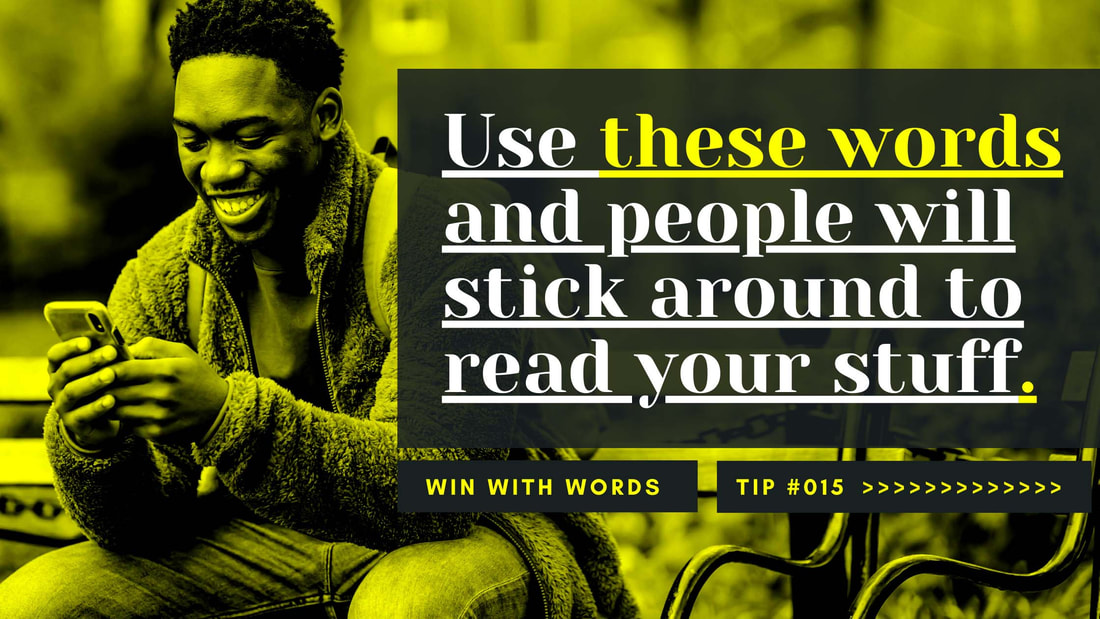|
It's a crude thing to admit, but the truth is often ugly, so here goes... 'Of all my skills, the one that makes me an effective publicist is my ability to manipulate situations.' There, I said it. Hello? Are you still there? Okay, well, for those of you that aren't put-off by talk of manipulation, I salute you. As a reward, by the end of this blog, you'll learn one of my most successful manipulation techniques — my ability to manipulate sentences. You'll see how this skill generates high-profile media coverage for my clients, myself and, once you deploy them in your business, for you. THE GOOD NEWS: this technique is 100% ethical. THE BAD NEWS: this technique will suck valuable minutes from your life. The manipulation technique (spiky words) It amazes me how little attention people give the words they use. Seemingly, these people think all words are created equally. Grow up! This is the belief of a buffoon. Words are no more equal than athletes, singers or chefs; some are world-class, the rest are not. To quickly draw people into your writing and sustain their interest, chase world-class words as if your life depends on it. To illustrate my willingness to chase world-class words, consider how much time I 'wasted' on the opening sentence of this blog post. 18-minutes, to be precise. 18-minutes trawling through lifeless, beige, ordinary words before gleefully slipping 'crude', 'ugly' and 'admit' into proceedings. Why? Because 'crude', 'ugly' and 'admit' are what I call 'spiky words' — provocative words that jolt people out of their daily routines, expectations and complacencies; compelling them to read-on. Example: Imagine you're having coffee with a friend. Which of these two sentences would arouse the most curiosity in you? Sentence #1: "Guess what Lou said earlier..." Sentence #2: "Guess what Lou admitted earlier..." (Make no mistake, in the pursuit of interesting sentences, these are the exact low-brow soap opera scenes playing in my head every single day. Sad, really) When it comes to hooking attention and winning high-profile media coverage for my clients, however, this technique is magnetic, as I showed you here and here — where I dissect some of my most successful media pitches for clients. Ultimately, then, when you write, be conscious of your word choices and bear in mind that the first words tumbling out of your head are unlikely to be the most effective words, rather, they're probably the most familiar, common or everyday words — alien characteristics to spiky words. Sure, by all means keep those lifeless words in draft #1 as placeholders, but for maximum engagement, return to them, reflect on them, replace them. Spiky words in popular culture So, how can you develop your command of spiky words? And, where in everyday life can you find irresistible examples? As you might suspect, good spiky words are common in news headlines — be it print, online or broadcast — but in my experience, sensational spiky words are found somewhere you would've never imagined; movie loglines. For the uninitiated among you, a movie logline is: '... a one-sentence summary or description of a movie. Loglines distill the important elements [of a film] into a clear, concise teaser. The goal is to write a logline so enticing that it hooks [people into wanting to watch the movie]' - source: Masterclass Famous logline examples: Here are 3 famous movie loglines. For your understanding, I have underlined the spiky words in each one. Logline #1: The Matrix A computer hacker is led by a stranger to a forbidding underworld, where he discovers the shocking truth – the life he knows is the elaborate deception of an evil cyber-intelligence. Logline #2: Finding Nemo When his son is swept out to sea, an anxious clownfish embarks on a perilous journey across a treacherous ocean to bring him back. Logline #3: The Edge of Seventeen A troubled teenager finds high school life even less bearable after she catches her childhood best friend hooking up with her popular older brother. Quick exercise: Can you spot the spiky words in the below loglines? Logline #1: After experiencing a traumatic event on her school bus, Aleena bottles up her anger until a chance connection triggers a small act of rebellion. Logline #2: Heena, desperate to get out of her soul-less job, goes on a mid-week pub session with her co-workers where they all descend into animalistic carnage. Logline #3: 1852, Wales: a desperate young mother carries out a forbidden ritual to save the soul of her unbaptised dead baby, but is tricked into taking on a terrifying burden. Find these and other logline gems here. My BEST-EVER spiky word: The one spiky word that has landed me the most media coverage, the most interviews, awards, newspaper front covers, and an unexpected trip to the U.S was actually a word I deployed during the Marketing of a personal project. (sorry, clients!) In 2018, I made a short film/social experiment called '61 Hugs'. Within days if its release, I was sucked into the most beautiful 18-month whirlwind of media coverage and acclaim. Here is the official logline, which, by the way, took me approx seven days to write: Crippled by a lifetime of overthinking, CK is a typical artist — forever worried about rejection, people’s perceptions and how things look. One day, he is challenged to walk the busy streets and ask sixty-one strangers for a hug. Although terrified by the inevitable rejections ahead, he accepts, clinging to his long-standing belief that overthinking is the enemy of remarkable. On reflection, it's too long. I was clearly a logline novice in 2018. As for my ability to manipulate sentences for maximum impact, however... well, opening a sentence with 'crippled' was never going to hurt, was it? And here it is... 61 Hugs, the cause of my 18-month whirlwind. Of course, like all self-respecting artists, having found a formula that works, I have shamelessly replicated it across all projects since. For example, here's the logline for my new TV series — released later this year: Fed-up with the concept of perfection, an artist opens himself up to failure and embarrassment by building imperfection into his new artwork. (No shame! Still, at least it's not a yawn-a-thon this time) Conclusion: Words are not equal. Sentences are not equal. Engagement is not equal. If they were, copywriting wouldn't be a lucrative profession. If you want to better secure and retain attention with the words you deploy across your Marketing, while I don't necessarily advocate hiring a copywriter, I do beg you to start using words consciously. With every sentence you write, ask yourself: 'is this the best word to use here or is there a more provocative word that (a) has the same meaning (b) better piques interest (c) doesn't sacrifice sentence fluency?' Now, if the prospect of conscious writing and sentence fluency bores the shit out of you, then yes, hire a copywriter, life's too short. To boost your media presence and better engage audiences, call us on 0114 491 0636 or email us on [email protected] — we're the most meticulous PR specialists you'll talk to today. Alternatively, click here for FREE access to our other brilliant writing & communications articles.
0 Comments
Leave a Reply. |
Categories
All
Archives
June 2024
|


 RSS Feed
RSS Feed